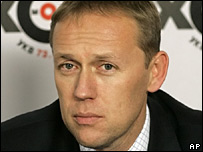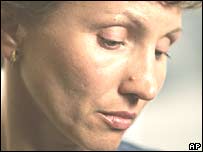Did this man kill Litvinenko?
 By Rupert Wingfield-Hayes
By Rupert Wingfield-Hayes
BBC News, Moscow
As Britain seeks the extradition of former KGB-agent Andrei Lugovoi, the chief suspect in the murder of Alexander Litvinenko, our correspondent goes to meet the man who continues to protest his innocence.
The first time I met Andrei Lugovoi in his Moscow office he offered me a cup of tea. I hesitated. He laughed. Lugovoi was relaxed, amused by my discomfort, not at all on the defensive.
A month later I met him again, this time at a petrol station on the Moscow ring road.
He jumped out of his large Toyota four wheel drive a cheeky grin on his face. "How are you?" he said reaching out to shake my hand.
Andrei Lugovoi is quite a charmer, and quite a showman.
Thick snow was still on the ground as we pulled up at his walled compound deep in the forest outside Moscow.
We entered a large building that looked like a gymnasium.
Inside stood a group of men in military fatigues with thick necks and close-cropped hair.
"How about some shooting?" suggested Mr Lugovoi. "This is the only private shooting range of its type in Moscow" he told me proudly.
Guns and boxes of ammunition appeared on a large table. Quickly and silently the guns were loaded.
The thick set men sprang in to action: running, crouching, firing, reloading. It was an impressive show.
But what about Lugovoi himself. Would he perform for the camera?
"No problem," he said. He picked up a gun and proceeded to fire off round after round, pausing to reload, and then firing away again.
It is not the sort of thing I would do if I were under investigation for murder.
But then there are lots of things about Mr Lugovoi that do not make sense.
For a start, Andrei Lugovoi is not an obvious assassin.
Much of the Western media has dwelt on his background in the KGB, suggesting he is some kind of ex-spy.
But Andrei Lugovoi has never been a spy. He is, and always has been, a bodyguard.
The next peculiar thing about Mr Lugovoi is his list of friends and clients.
If Mr Lugovoi is an agent of the Russian state, as some have suggested, then he keeps pretty strange company.
His oldest client, the man who first hired him as a bodyguard after he left the KGB, is none other than Boris Berezovsky.
For those who are not familiar with Mr Berezovsky, he is the Russian billionaire who was once close to President Vladimir Putin, but is now his most avowed critic and enemy.
From his base in London he runs a vocal and visceral campaign against Putin's Kremlin.
Mr Berezovsky was also the closest friend and benefactor of a certain Alexander Litvinenko.
On the very day that Andrei Lugovoi is accused of poisoning Litvinenko at the millennium hotel in London, he also went to visit Boris Berezovsky at his Mayfair office.
The subject of their meeting? A contract for Mr Lugovoi to protect the billionaire's daughter.
Andrei Lugovoi is, in other words, a man who was well trusted by both Mr Berezovsky and Alexander Litvinenko.
Indeed Boris Berezovsky told British police that when he first heard that Lugovoi was suspected of Litvinenko's murder, he did not believe it.
There seems little doubt that British police have compelling evidence pointing the finger directly at Andrei Lugovoi.
Although it has not been made public, it is well known that the most crucial evidence is the trail of radioactive Polonium 210 that seems to have followed Mr Lugovoi across Europe and around London.
It was even found on the seat he used while watching an Arsenal football match at the Emirates Stadium in London.
Each time I have met Andrei Lugovoi I have asked him to explain the trail of Polonium. He has never been able to do so.
But the one thing he has repeated insistently is that he had no motive to kill Litvinenko.
"Why would he kill someone he was hoping to do business with? Why would he jeopardize his business operations that stretch from Moscow to London, to Tel Aviv?" It is a good question, and one I have no answer to.
Another is how someone like Lugovoi could have got hold of Polonium 210. Even in Russia, it is not something you can get on the black market. Polonium is extremely rare, very expensive and very difficult to handle.
In Moscow conspiracy theories abound about what really happened to Alexander Litvinenko.
One of the latest, and most compelling goes something like this; Lugovoi and Litvinenko were working for the British secret service.
At some point last year Andrei Lugovoi got caught and turned by Russia secret service agents. They then forced him to betray and ultimately to kill his friend.
It is pretty far fetched, but then so is everything about the Litvinenko case.
While the evidence may point towards Lugovoi as the killer, it seems highly improbable that he acted alone.
Only one thing seems fairly certain, that we will never find out who really ordered the killing of Alexander Litvinenko.
From Our Own Correspondent was broadcast on Saturday, 26 May, 2007 at 1130 GMT on BBC Radio 4. Please check the programme schedules for World Service transmission times.
Story from BBC NEWS:
Published: 2007/05/26 10:33:54 GMT
© BBC MMVII




